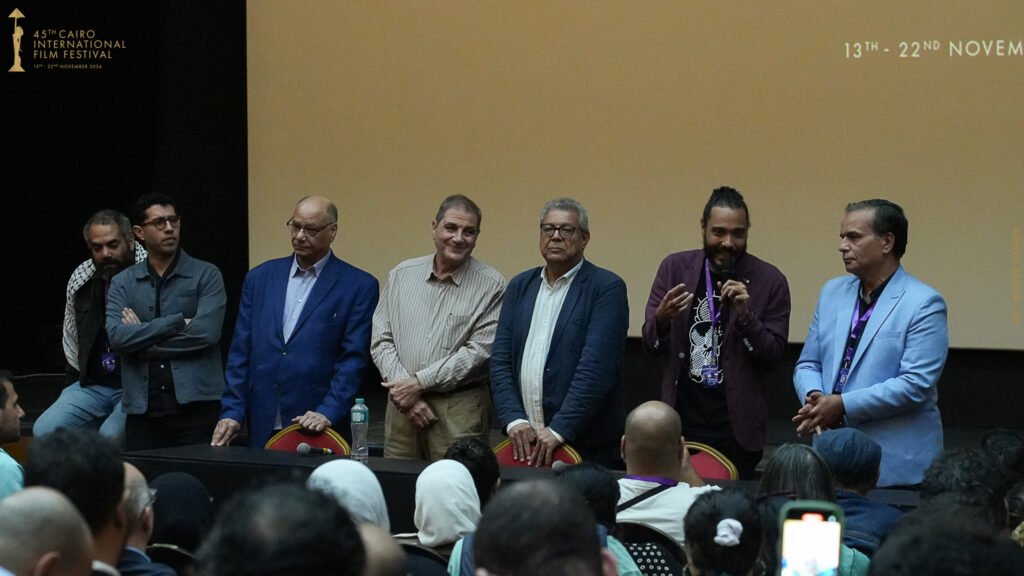The Cairo International Film Festival (CIFF) is no stranger to drama, but this year, the drama isn’t confined to the screen. A heated dispute has erupted between Amir Ramses, former director of CIFF, and Essam Zakaria, the current director of the festival’s 45th edition. At the center of this clash are allegations, criticisms, and what both sides have deemed “misleading” or “insulting” remarks.
The Beginning of the Feud
The tension began when Essam Zakaria, known for his sharp critiques and dedication to cinema, gave an interview where he expressed dissatisfaction with the festival’s outcome. He attributed this to internal challenges, claiming only 50% of his vision was realized due to a “toxic work environment” fostered by CIFF President Hussein Fahmy.

Zakaria also criticized certain organizational aspects, including audience management, film selection processes, and controversies around specific films like “Wein Serna”, Dorra Zarrouk’s directorial debut, and a dubbed Moroccan film, which he claimed did not align with the festival’s usual standards.
This did not sit well with Amir Ramses, who took to social media to address what he called “misleading statements.” Ramses, who resigned from the festival under contentious circumstances in previous years, accused Zakaria of distorting facts about past editions and unfairly criticizing festival operations.

Ramses highlighted what he considered an unjust dismissal of the growth CIFF witnessed in recent years under his tenure, particularly regarding audience engagement and ticketing systems.
Key Points of Contention
1. Audience Attendance and “Sold Out” Shows
Zakaria’s remarks about the current year’s “sold out” screenings being inaccurate and mismanaged sparked Ramses’ ire. Ramses defended the systems he implemented in previous editions, which ensured precise ticketing metrics to reflect actual attendance. He claimed Zakaria’s assessment ignored the progress made during his tenure and unfairly portrayed the festival as poorly managed in the past.
Zakaria countered by stating his comments referred only to the 45th edition, where he observed discrepancies between sold-out tickets and actual audience numbers in some venues.
2. The “Wein Serna” Controversy
Dorra Zarrouk’s directorial debut, “Wein Serna”, sparked debate during the festival. The film, which focuses on Palestinian lives, was programmed in the Arab Horizons section and received a high-profile screening in the Grand Theater.

Zakaria suggested the film would have received less criticism if it had premiered at a festival like El Gouna.
Ramses, however, viewed this as an insult to both El Gouna and CIFF audiences, claiming Zakaria’s comment implied CIFF viewers were less discerning.
Zakaria later clarified, explaining his remark was intended to highlight differing perceptions between festivals, not to demean any audience.
3. Dubbed Moroccan Film Debate
A Moroccan comedy dubbed into Egyptian Arabic also drew mixed reactions. Zakaria defended its inclusion as an experiment to gauge Egyptian audiences’ acceptance of dubbed films.

Ramses criticized the decision, calling it a departure from the festival’s artistic integrity and dismissing the film’s merit beyond its dubbing.
Underlying Issues: Toxic Work Culture?

Zakaria’s interview with El Sherouk news revealed deeper issues, including his strained relationship with Hussein Fahmy. He accused Fahmy of creating divisions within the festival team and preventing him from fully exercising his role. Zakaria described the work environment as “toxic” and hinted at his potential resignation if the situation didn’t improve.
Our Take on CIFF’s 45th Edition
This year’s Cairo International Film Festival left much to be desired. In our opinion, the festival’s quality took a significant hit, and the only decent elements were those planned during the postponed edition when Amir Ramses was still part of the leadership.
The film lineup this year was both overwhelming and underwhelming. While the organizers boasted about featuring nearly 200 films, the selection’s overall quality was weak. We’d all much prefer 50 excellent films over an inflated list that includes mediocre or forgettable entries. The scheduling was an absolute mess. In many cases, empty halls were a result of ticket sellers lacking proper schedules.
At one point, tickets had “???” printed on them because even the organizers didn’t know what was showing. Frequent changes to the schedule forced attendees to exchange tickets multiple times. While this may not be Tazkarti’s fault, their online booking system’s consistent failures certainly didn’t help. Many were left frustrated, unable to plan ahead or secure tickets without standing in line at the box office a day in advance.

More troubling was the allocation of theaters. Films with strong appeal, such as Bassam Mortada’s “Abo Zaabal 89”, were placed in small theaters that quickly sold out, while main halls remained empty for lesser-known films.
How was it acceptable to relegate such an anticipated title to a smaller venue? Meanwhile, audiences were unable to access it, while prime slots went to movies no one remembers.
As for the decision to include a dubbed Moroccan film? Frankly, it’s beyond insulting. This choice undermines the audience’s intelligence and the festival’s artistic credibility. It’s not even worth delving into how misguided this was.
What’s Next for CIFF?
As the dust settles, one thing is clear: CIFF’s leadership must address these issues head-on to restore confidence among stakeholders, audiences, and industry professionals.
CIFF’s 45th edition could have been a strong return for Egyptian cinema on the global stage, but instead, it faltered under poor planning, mismanagement, and questionable artistic decisions. For the festival to thrive in the future, it needs to focus on quality over quantity, better planning, and respecting its audience.
For now, CIFF remains at a crossroads, with its legacy hanging in the balance. Will this clash lead to constructive change, or will it be just another chapter in the festival’s storied history of behind-the-scenes drama? Only time will tell. Here’s hoping CIFF learns from this year’s missteps and comes back stronger.









What do you think?
It is nice to know your opinion. Leave a comment.